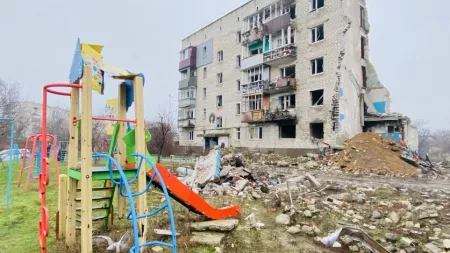As Ukraine marks 1,000 days since the start of Russia’s full-scale invasion, the impact on civilians remains staggering. Since February 24, 2022, at least 11,973 civilians have been killed and 25,943 injured.
Younger generations of Ukrainians have not been spared from the violence. According to Ukrainian authorities, 622 children have been killed and at least 1,664 have been injured. In addition, an estimated 19,500 children have been illegally deported to Russia, separated from their homes and families. The war's profound impact on the physical and psychological well-being of children in the country cannot be overstated.
“Now we are witnessing how, despite the daily growing humanitarian needs, the level of international support and global attention is decreasing,”Franziska Joerns, CARE Ukraine Deputy Country Director
Yulia Velman, acting director of the orphanage in Pavlohrad, Dnipro region, shared, “Children now spend most of their time in the shelter because there are night sirens and constant alarms during the day. We have even moved the beds to the shelter and they sleep here because it is very difficult to pick them up at night and move them, and this negatively affects their emotional state."
The scale of internal displacement has reached unprecedented levels, with 3.6 million internally displaced people registered across Ukraine. Almost 60% of displaced people are women and girls. A further 4.2 million citizens of Ukraine have the status of temporary protection in EU countries.
“We see families experiencing their second or third displacement, while some women and children are returning in dangerous frontline areas due to financial difficulties,"Franziska Joerns, CARE Ukraine Deputy Country Director
“Now we are witnessing how, despite the daily growing humanitarian needs of Ukrainians, the level of international support and global attention to the situation in Ukraine is decreasing,” says Franziska Joerns, CARE Ukraine Deputy Country Director. “We see families experiencing their second or third displacement, while some women and children are returning to their homes in dangerous frontline areas due to financial difficulties as they cannot find work or afford to pay rent. In this situation, our partnerships with local organizations and international support are critical to continue providing life-saving assistance and supporting people to rebuild their lives.”
Tetiana, a resident from Pokrovsk, shared her story of living in a war zone: "It means staying in basements. There is no life. This is a basement and there is nothing else. You cannot go outside. You drink water and survive. It's scary.”
"It means staying in basements. This is a basement and there is nothing else. You cannot go outside. You drink water and survive. It's scary.”Tetiana, a resident from Pokrovsk, Ukraine.
With winter approaching, the widespread destruction of infrastructure compounds these hardships. Almost 144,000 residential buildings, more than 1,900 healthcare facilities, and nearly 3,800 schools and educational institutions have been damaged or destroyed in indiscriminate attacks in the last 1,000 days. This devastation has left countless families struggling to find safe accommodation, and access medical care and essential services.
Despite severe access and security challenges, CARE and Ukrainian organizations with whom we partner have provided support to almost 1.5 million Ukrainians. However, the needs continue to grow, especially as winter approaches. Humanitarian support is urgently needed, including shelter repairs, winter clothes, and fuel for heating. The demand for comprehensive psychosocial support is also high, as the conflict has left lasting mental scars, particularly on children and families who have endured prolonged trauma.
“Children now spend most of their time in the shelter because there are night sirens and constant alarms during the day."Yulia Velman, acting director of the orphanage in Pavlohrad, Dnipro region, Ukraine.
A central aspect of the work by CARE and our partners is to provide support for survivors of gender-based violence. In 2023, the National Police of Ukraine registered more than 291,000 cases of domestic violence, an increase of 20% compared to 2022. Ukrainian investigators reported 322 cases of conflict-related sexual violence, affecting 207 women and 115 men, with experts estimating the real numbers could be ten times higher. Addressing the trauma of survivors requires both immediate and sustained mental health services, underscoring the critical need for long-term international support.
CARE and its partners urge the global community to increase funding for humanitarian aid in Ukraine, particularly for local and national organizations and women first responders who provide protection and gender-based violence services. Immediate funding is essential to ensure humanitarian aid can reach the most vulnerable, sustain support during the harsh winter, expand mental health programs, and address the reconstruction of critical infrastructure, providing hope and essential relief for Ukraine’s affected communities.
"Our partnerships with local organizations and international support are critical to continue providing life-saving assistance and supporting people to rebuild their lives.”Franziska Joerns, CARE Ukraine Deputy Country Director
CARE also calls on all parties to conflict to fulfil their obligations under international humanitarian law to protect civilians and humanitarian space and facilitate full, safe, and unhindered access for humanitarian organizations throughout Ukraine so that aid can be delivered in a principled manner and without obstruction.
For further information, or to arrange interviews, please contact:
Halyna Bilak, Communication Coordinator, CARE Ukraine: [email protected]
